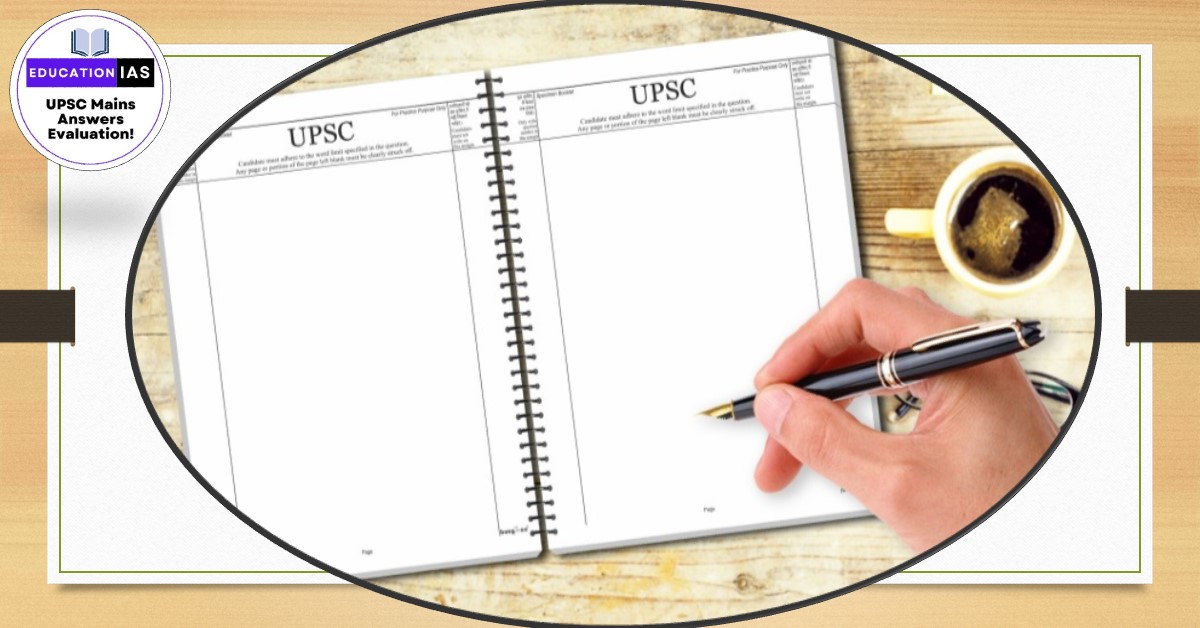Que. The Citizens’ charter has been a Landmark initiative in ensuring citizen-centric administration. But it is yet to reach its full potential. Identify the factors hindering the realisation of its promise and suggest measures to overcome them.
नागरिक-केन्द्रित प्रशासन को सुनिश्चित करने के लिए नागरिक अधिकार-पत्र एक ऐतिहासिक पहल रही है। किन्तु, इसे अभी भी अपनी पूर्ण क्षमता तक पहुंचना बाकी है। इसके वादे की प्राप्ति में बाधा डालने वाले कारकों की पहचान कीजिए और उन्हें दूर करने के उपाय सुझाएं।
Structure of the Answer
(i) Introduction: Introduce the concept of the “Citizens’ Charter” as a citizen-centric initiative aimed at improving governance but still facing challenges.
(ii) Main Body: Identify the factors hindering the realization of the “Citizens’ Charter” and discuss specific challenges preventing its full potential in administration.
(iii) Conclusion: Summarize the key factors preventing the success of the “Citizens’ Charter” and emphasize the need for overcoming these barriers to achieve effective governance.
Introduction
The “Citizens’ Charter” is a crucial initiative introduced to enhance “citizen-centric” governance by ensuring transparency, accountability, and better service delivery. However, despite its potential, the “Citizens’ Charter” has yet to reach its full potential due to several challenges hindering its effectiveness.
Lack of Awareness and Accessibility
(i) Limited Awareness: A significant number of citizens are unaware of the existence of the “Citizens’ Charter” or the services it guarantees. Without proper awareness, people cannot demand their rights or hold authorities accountable for subpar services.
(ii) Technical Language: Charters are often written in bureaucratic or legal language, making them difficult for the general public to understand. This limits the accessibility and engagement of the people who could benefit from it.
(iii) Geographical and Socio-Economic Gaps: Awareness campaigns are often concentrated in urban centers, leaving rural and marginalized communities unaware of their entitlements under the “Citizens’ Charter.”
(iv) Digital Divide: With increasing reliance on digital platforms, many citizens, especially those in rural or economically disadvantaged areas, struggle to access or engage with the services outlined in the Charter.
(v) Complex Procedures: The processes for filing complaints, obtaining services, or making requests under the Charter can be cumbersome, often deterring citizens from exercising their rights.
Inadequate Implementation and Monitoring
(i) Lack of Accountability Mechanisms: Many government departments lack clear accountability mechanisms to ensure the commitments made in the “Citizens’ Charter” are followed through. This lack of responsibility undermines the Charter’s effectiveness.
(ii) Delayed or Inconsistent Service Delivery: There are frequent delays in service delivery, and the quality of services does not always meet the standards promised under the “Citizens’ Charter,” leading to public dissatisfaction.
(iii) Weak Monitoring and Evaluation Systems: There is often insufficient monitoring to track the implementation of the Charter’s provisions. Without regular oversight, there is no way to identify gaps or areas for improvement.
(iv) Fragmented Oversight: Oversight responsibilities for the implementation of the Charter are spread across various departments and agencies, leading to confusion and a lack of coordination in enforcing its provisions.
(v) Lack of Feedback Mechanisms: Without a proper feedback system, it becomes difficult to assess how well services are being provided under the “Citizens’ Charter,” which stunts improvements and increases inefficiency.
Lack of Political Will and Leadership
(i) Political Apathy: There is often a lack of political will to ensure the full implementation of the “Citizens’ Charter.” This results in insufficient attention and resources being dedicated to its execution.
(ii) Short-Term Political Focus: Political leaders tend to focus on immediate, short-term concerns that promise quick electoral gains, rather than long-term governance reforms, such as the full realization of the Charter’s goals.
(iii) Bureaucratic Resistance: Bureaucrats may resist changes introduced by the “Citizens’ Charter” due to vested interests or reluctance to embrace new administrative practices.
(iv) Policy Inconsistency: Frequent changes in political leadership can lead to shifts in policies or priorities, preventing the consistent and sustained implementation of the “Citizens’ Charter” across different governments.
(v) Political Interference: Political interference in administrative processes can disrupt the “citizen-centric” nature of the Charter and hinder its goal of transparent and accountable service delivery.
Insufficient Resources and Capacity Building
(i) Resource Constraints: A significant challenge is the insufficient financial and human resources allocated to the implementation of the “Citizens’ Charter.” This limits the ability of government agencies to deliver services effectively.
(ii) Human Resource Gaps: Many public sector organizations lack adequately trained personnel to handle the responsibilities that come with enforcing the “Citizens’ Charter,” leading to poor service quality.
(iii) Technological Gaps: Many government departments do not leverage modern technologies to streamline service delivery, making the process slow, inefficient, and prone to errors.
(iv) Lack of Training for Public Servants: There is often a lack of continuous training for civil servants on the principles and procedures outlined in the “Citizens’ Charter,” which affects service quality.
(v) Uneven Resource Allocation: Resources are often concentrated in urban areas, leading to a disparity in service quality between rural and urban populations. This undermines the universal applicability of the “Citizens’ Charter.”
Conclusion
While the “Citizens’ Charter” holds significant potential to enhance governance, factors such as lack of awareness, inadequate monitoring, insufficient political will, and resource limitations hinder its full realization. Overcoming these challenges is essential for citizen empowerment and effective governance.
